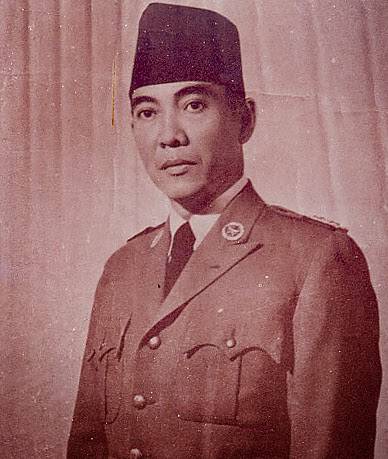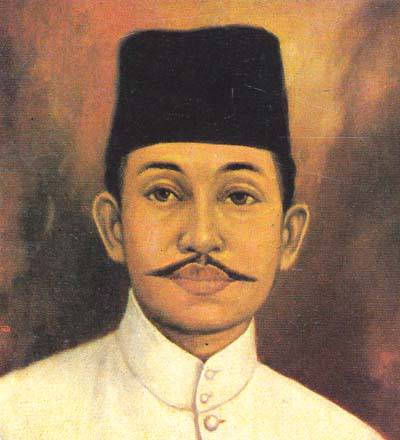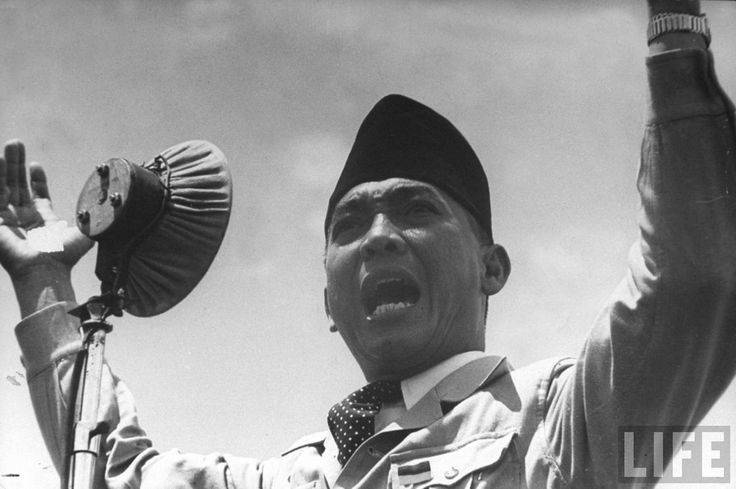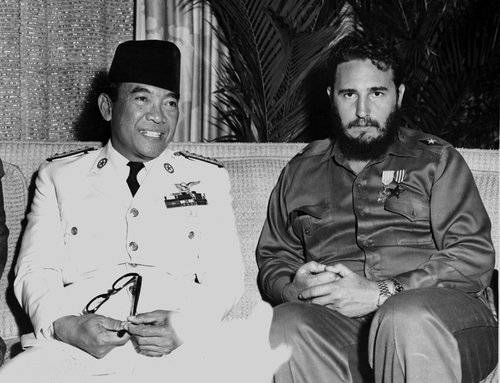The first president. What Sukarno wanted and why he was overthrown
 The decisive role, as for most countries of Southeast Asia, was played by the Second World War. And at the source of Indonesian independence was Ahmed Sukarno. It was he, who became the first president of sovereign Indonesia, who formed the basic principles for the further construction of Indonesian statehood. Today his name is forgotten, but in 1950-ies, Sukarno was considered one of the “main friends” of the Soviet Union. He called himself a socialist, although he himself was never a follower of the Marxist doctrine — Sukarno’s views were quite typical of the Asian and African countries of that time, the combination of socialist ideas with anti-imperialist nationalism. Nevertheless, both the personality and the views of Ahmed Sukarno, and his activities in the presidency are very interesting.
The decisive role, as for most countries of Southeast Asia, was played by the Second World War. And at the source of Indonesian independence was Ahmed Sukarno. It was he, who became the first president of sovereign Indonesia, who formed the basic principles for the further construction of Indonesian statehood. Today his name is forgotten, but in 1950-ies, Sukarno was considered one of the “main friends” of the Soviet Union. He called himself a socialist, although he himself was never a follower of the Marxist doctrine — Sukarno’s views were quite typical of the Asian and African countries of that time, the combination of socialist ideas with anti-imperialist nationalism. Nevertheless, both the personality and the views of Ahmed Sukarno, and his activities in the presidency are very interesting. In the spring of 1942, by suppressing the short and weak resistance of the Dutch colonial forces, Japan occupied the territory of Indonesia. As in other countries of Southeast Asia, in Indonesia, the Japanese authorities in every way sought the support of the local population and therefore constantly reminded about the cultural and racial affinity of the Indonesians and the Japanese. Representatives of the Japanese administration established contacts with the main Indonesian national liberation organizations. When it became clear in 1945 that Japan was about to be defeated in World War II, the Japanese administration began to prepare Indonesia for independence. There was even a Research Committee on the preparation of Indonesian independence, in which the Japanese leadership included the main Indonesian public and political figures of a nationalist kind. Among them was 44-year-old Ahmed Sukarno (1901-1970) - a veteran of the national liberation movement in Indonesia, who worked closely with the Japanese authorities and even received a personal audience with the Japanese emperor. The Dutch didn’t like Sukarno and accused him of collaboration and servitude to the Japanese, but in reality the politician who dreamed of the independence of his native country simply saw the Japanese as tactical allies who would help him to overthrow the power of the Dutch colonialists.
When 6 June 1901 was born in the ancient Indonesian city of Surabaya, in the east of Java, a little boy was born, no one could assume that in some four and a half decades he would be destined to play a crucial role in modern stories Indonesian people, to become the founding father of the Indonesian state. At birth, the boy was called Cusno. By his very origin he seemed to emphasize the unity of the peoples and cultures of Indonesia. The father of the child, Raden Soekemi Sosrodiharjo, worked as an elementary school teacher, but by birth he was a representative of the old Javanese aristocracy. He professed Islam, like most Javanese. Mother Ida Aiyu Nyoman Rai came from a family of Brahmins from the island of Bali, her parents professed Hinduism.
The boy was not very healthy, he was often sick, and his father, deciding that the whole thing was in an unsuccessful name, renamed Kusno to Carnot, in honor of the famous hero of the ancient Indian epic Mahabharata. To the name of Carnot added the prefix "Su", which translated means "Best." The family took money from the family, so young Sukarno went to 1912 in the year to get an education in one of the best schools in East Java, and then in 1916, he entered the Dutch college in Surabaya. While studying at college, Sukarno met a man who had a very great influence on the development of his outlook and in general on his further life path. This man was Omar Said Chokrouaminoto (1882-1934) - an Indonesian thinker and politician who founded “Sarekat Islam” - “Islamic Union” - the first serious national political organization in the Netherlands East-India in 1912. Chokroaminoto (pictured) adhered to very moderate views, in particular, despite the declared revival of Islamic values, he advocated liberal democracy and cooperation with the Dutch administration.
 This position was tactically quite correct - the Dutch, in turn, were also loyal to the activities of Chokronaminoto, which made it possible to increase the influence and number of Sarekat Islam. Young Sukarno got close to Chokroaminoto and, in the 1920 year, at the age of just 19 years, married his daughter 14-year-old Utari. In 1921, Sukarno entered the Bandung Institute of Technology, where he studied construction and architecture. 25 May 1926, he completed his studies at the institute and already in July of that year, he created his own firm specializing in architectural activities. At this time, Sukarno designed many houses in Bandung. However, the work of the architect and the opening of his own business did not prevent Sukarno from becoming a political figure.
This position was tactically quite correct - the Dutch, in turn, were also loyal to the activities of Chokronaminoto, which made it possible to increase the influence and number of Sarekat Islam. Young Sukarno got close to Chokroaminoto and, in the 1920 year, at the age of just 19 years, married his daughter 14-year-old Utari. In 1921, Sukarno entered the Bandung Institute of Technology, where he studied construction and architecture. 25 May 1926, he completed his studies at the institute and already in July of that year, he created his own firm specializing in architectural activities. At this time, Sukarno designed many houses in Bandung. However, the work of the architect and the opening of his own business did not prevent Sukarno from becoming a political figure. The twenties were a time of serious trials for Sukarno. It was then that the formation of his views took place, and the young man gradually turned into a political figure known throughout the country. At that time, the Indonesian national movement had three main areas - Islamic fundamentalism, secular nationalism and Marxism. Sukarno, being a far-sighted politician, thought of combining all three directions - he advocated loyalty to religious traditions, national liberation, and social justice. 4 July 1927 was a founding congress in Bandung, at which the National Party of Indonesia was established. But it did not last long, falling apart in the 1931 year, four years after its creation. At the same time, Sukarno was persecuted by the Dutch administration. In 1929-1931 and 1933-1942 Sukarno was in prison and exile. When he was released, he traveled around the country and spoke to a wide range of audiences. When the Netherlands East Indies was occupied by Japanese troops in 1942, Sukarno cooperated with the Japanese. He believed that Asians are Japanese for Indonesia in any case more acceptable than the Dutch. Moreover, Japan immediately promised to grant independence to the former Netherlands East Indies. True, hoping to turn Indonesia into a subordinate territory, the Japanese leadership for three years attracted independence and decided to take this step only in 1945.
17 August 1945, three days after the surrender of Japan, Indonesia declared its political independence. The Central National Committee of Indonesia was formed, which approved the first persons of a sovereign state. Ahmed Sukarno was proclaimed president of independent Indonesia, and his associate Mohammed Hatta - Vice-President. Thus began a new page in the Indonesian history and in the life of Sukarno.
When World War II ended in the defeat of Japan, the Dutch colonialists again tried to strengthen themselves in Indonesia. The authorities of the Netherlands did not want to lose the richest colony, so the leadership of the Netherlands refused to recognize the political independence of Indonesia. But the Indonesians after the war, especially after seeing the weakness of the Dutch administration, surrendered to the Japanese, did not want to live under the control of foreigners. Naturally, armed resistance to the Dutch colonialists began. The war for the independence of Indonesia lasted three years. In December, the Dutch bombed Yogyakarta, the capital of the country, at that time, 1948. They succeeded in capturing Ahmed Sukarno, Vice President Mohammed Hatt and Prime Minister Sutan Sharir. All high-ranking prisoners of the Dutch authorities were sent into exile. However, with the mediation of the UN and the United States, the liberation of the Indonesian leaders was achieved. In August, 1949, Sukarno returned to Yogyakarta. 23 August 1949 held a conference in The Hague where it was decided to transfer sovereignty over the former Netherlands East Indies to the United States of Indonesia. 17 August 1950 Indonesia was re-declared an independent state. This time its sovereignty was recognized by most countries of the world. Only the western part of the island of New Guinea remained under the control of the Netherlands.

The first time, seeking to gain the support and recognition of the West, Sukarno began building a multiparty political system in Indonesia. The first seven years of independence are called the era of "liberal democracy." Although Sukarno proclaimed the country a unitary republic, he was forced to significantly reduce the powers of the president and turn the country into a parliamentary republic. In Indonesia, there were numerous political parties, including opposition to the president. Gradually, however, Sukarno became increasingly convinced that the concept of multi-party democracy was not very suitable for a country that was just beginning its path of an independent state. Evidence of this was the political and economic turmoil that accompanied the early years of Indonesian independence. Attention Sukarno, who had studied Marxist ideas as far back as 1920, began to attract socialist methods of economic management. In addition, he hoped to enlist the support of the Soviet Union, which provided serious material and organizational assistance to those states that proclaimed a course towards socialist orientation. Although the turn to socialism could not please the influential Muslim and nationalist parties in Indonesia, Sukarno began to draw closer to the Soviet Union.

Sukarno’s final turn towards the socialist camp took place in 1957. The head of state adopted the new doctrine of the development of the country "Nasakom", which provided for the construction of “Guided democracy” and abolished the parliamentary republic. Nasakom is an acronym based on the Indonesian words NASionalisme (Nationalism), Agama (Religion) and KOMunisme (Communism). Having criticized Western-style parliamentary democracy, Sukarno accused her of contradicting the original way of life of Indonesians and proposed to create a system that exemplified the traditions of the Indonesian peasant community. In such a model, all power was in the hands of the headman. The powers of the president were significantly expanded, the post of prime minister was eliminated, and the parliament, which was attended by representatives of the opposition parties Sukarno, was dissolved. The new composition of the parliament was already approved by the president himself, therefore there were only people loyal to him.
Sukarno began to strengthen political and economic relations with the Soviet Union. Relying on military-technical assistance and moral support from the Soviet Union and other socialist countries, in 1960, Indonesia began military intervention in the western part of New Guinea, which was still under the control of the Netherlands. As a result of the armed confrontation, the Netherlands were forced in 1962 to transfer Western Irian to the UN, and in 1963, the territory of Western New Guinea became part of Indonesia. At the same time, Sukarno was very actively opposing the creation of an independent Malaysia. According to the founder of the Indonesian statehood, Malaysia, created on the basis of the British colonies and protectorates in Malacca and Kalimantan, turned into a potential conductor of US and British influence in the region. As it turned out, he thought absolutely correctly - Malaysia became one of the important strategic allies of the West in the Asia-Pacific region. In addition, Sukarno considered the territories of Sabah and Sarawak in the north of Kalimantan Island, which were part of Malaysia, to be part of Indonesia. He supported the groups of communist partisans operating in Malaysia, established close military cooperation with the PRC, the DPRK and the Democratic Republic of Vietnam. When Malaysia was still admitted to the UN, 7 January 1965 of the year Sukarno announced Indonesia’s withdrawal from the United Nations.
Sukarno's politics in 1957-1965 actively supported by the Communist Party of Indonesia, which by this time had become the largest Communist Party in the region and had millions of members. On the other hand, the activity of Sukarno, especially after the socialist turn, caused a growing rejection from the West. The United States and its allies feared that the Communists might even come to power in Indonesia, in which case the largest state in Southeast Asia would be on the side of the Soviet Union. This Washington could not allow, especially given the events in the neighboring countries of Indochina. Not satisfied with the policy of Sukarno and representatives of right-wing nationalist and religious fundamentalist circles. Among the Indonesian military elite matured a conspiracy. But it became known about him the left part of the officer corps, which tried to preempt the conspirators and make a revolutionary coup. However, the actions of the left were blocked by the rest of the army.
Taking advantage of political chaos, 1 of October 1965 was taken over by Major General Mohammed Suharto, who held the post of commander of the army’s strategic reserve. After Suharto came to power, Indonesia’s political course was radically changed. The military and right-wing radicals carried out a real massacre of the Indonesian communists, whose victims were more than a million people. Sukarno formally maintained the presidency until 1967, although he was in fact under house arrest. The former head of state has worsened heart disease, his condition became worse and worse. 21 June 1970, 69-year-old Ahmed Sukarno passed away.
Information